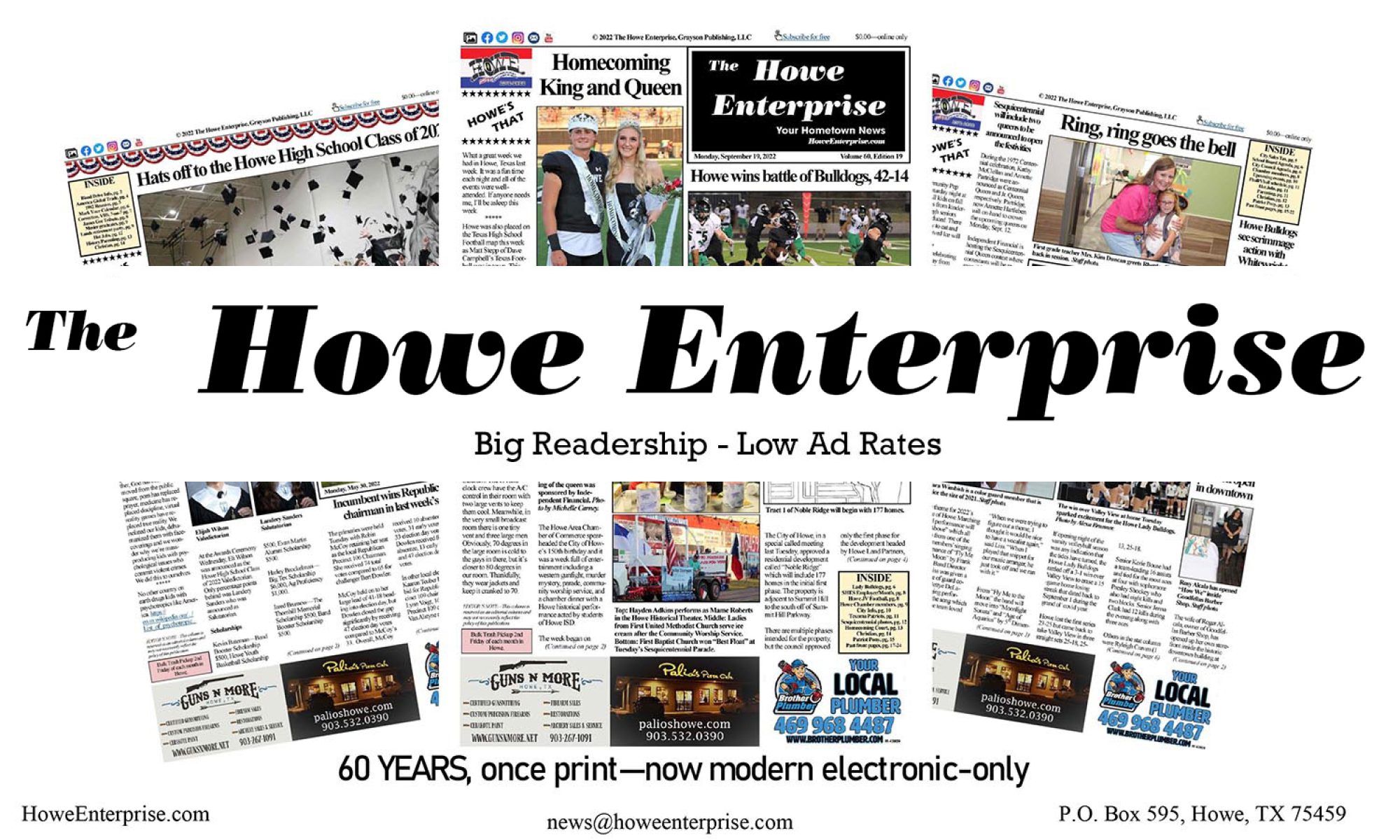KXII-TV ran a story last week that claimed the City of Howe owes the City of Sherman $300,000 after not paying their sewage bill for 15 months. Howe City Administrator Joe Shephard denied that accusation with the following statement to the Howe Enterprise, “A recent news broadcast would lead the listener to believe Howe has not paid the sewer bill from Sherman for over 15 months. The facts are, from February 2019 through July 2020 the citizens of Howe have paid Sherman $907,047. Sherman charges us for not only sewage, but for rainwater that enters the system. This is one reason your water/sewer bill is so high. The huge amount we, the citizens of Howe, pay Sherman is almost one-third (1/3) of the City’s total annual $3.3 million budget.”
Shephard told KXII that the rates only go up every time it rains. That’s because in Howe, like all other cities, the rainwater seeps into the same pipe as all the sewage, and all of that goes to Sherman to be treated. The City of Howe pays on the amount going through the pipe.
“So, we’re billed per gallon, that runs through this meter,” Shephard said to KXII. “So, when it doesn’t rain, our normal bill is about $30,000 but when we get big rain, it could go up to $80,000, $90,000 to $100,000 and that is what puts us behind.”
Fifty to one hundred-year decisions frighten the death out of community leaders. Before marrying a decision with long term effects, every plausible defection must be reasonably calculated in that decision. To fix a short-term problem, do you make a long-term decision that could set back a community 50 years? The joint sewer contract with the City of Sherman will go down as one of the most disastrous decisions in the history of this community. Some say it was only the beginning of a 4-year period of head scratching decisions by former city council members.
According to a 1968 Howe Enterprise edition, the City of Howe was initially approached by the City of Sherman during the time Sherman was trying to obtain a grant to enhance the sewer treatment plant on FM 1417. For Sherman to qualify for the grant, they needed Howe’s population to qualify. In the original 1968 agreement, Sherman provided Howe citizens wastewater treatment at a maximum of $0.14 per 1,000 gallons. In March of 1986, Howe was paying a flat rate of $487.50 per month, or $0.60 cents per customer. According to the original 1968 contract, Howe was limited to 250,000 gallons per day. Due to rain infiltration, Sherman maintained that the levels of infiltration were as high as 600,000 gallons and in March of 1986 filed suit against Howe for breach of contract.
Sherman cited expansion in both cities from 1968 to 1986 along with the Clean Water Act of 1972 for the need to improve their sewer system. At the time of the lawsuit, Sherman was in the middle of an $18.5 million expense updating their facility.
Former Howe City Administrator Dick Britton told the Howe Enterprise in March of 1986, “Sherman’s suit is based on distorted fact and is no more than a devious attempt to weasel out of our longstanding agreement.”
Britton noted then that Howe offered Sherman to increase its monthly fee by $500 per year for four years, making their annual payments jump from $6,000 to $25,000 per year. Sherman, he said, refused to consider the offer, instead wanting $60,000 to $70,000 annually from Howe.
Howe hired John Hill, a Sherman attorney, to represent the City of Howe in the case and soon afterward, Jerry Kirby resigned his seat as Mayor of Howe leaving Mayor-Pro-Tem Marion Allison in the seat until an election. Ray Bledsoe was eventually elected mayor in April of 1987. City Administrator Dick Britton soon left.
Howe had filed a countersuit on October 10, 1986 stating, among other things, that the contract was part of a series of agreements that give Howe part ownership of the sewer treatment plant. Howe also sought damages if the contract was declared void.
“I sat in that courtroom for five days when Sherman sued us,” said Bledsoe in a 2016 interview. “The judge got up and said, ‘I’m going to dismiss the jury. He said, ‘That contract is not worth the paper it’s printed on’ (referring to the 1968 contract). The judge instructed Howe to pay Sherman for sewer and for Sherman to not discontinue service and for each city to come to an agreement. Bledsoe stated that he worked with Sherman’s David Gattis and Howe would pay Sherman $3,000 per month on a temporary basis.
As we fast forward 30 plus years, Then-Howe Mayor Jeff Stanley told the city council in the August 2016 council meeting, “Our normal bill from Sherman is a little over $22,000 (per month) and recently they have been $60,000. This month should be closer to normal, but we haven’t had many of those in the last couple of years (due to the amount of rain).
Although the city adjusted the wastewater contract services budget expense from $310,400 in 2016 to $550,000 in 2018, they did not pass the bill on to the citizens. The adjustment would result in an increase of roughly $10-$15 per household.
“We’re not asking for an increase from the citizens,” City Administrator Joe Shephard told the council the same night. “We’re just using funds from other places to cover that. We’re not increasing the rates.”
The best news for Howe citizens is that the city is currently in the stages of working with Tomlin Investments to create a wastewater treatment facility to move away from the Sherman Agreement. Howe’s future home development and commercial development growth depend a lot on how much capacity the current infrastructure can handle before a new necessary plant can be in place. The facility is designated for location at Blythe Road near US Highway 75.



